BRAKING PERFORMANCE
Going fast is one thing, but when you get to that next corner, you need to be able to check your speed quickly and with confidence. In the past, it seemed that KTM [and now Husqvarna] have always had the advantage in the power department because they use Brembo brakes while the Nissin brakes that are usually spec’d on the Japanese motocrossers held the edge in linear feel. Despite some of the OEMs stepping up to ever-larger front rotors in an attempt to gain even more whoah power for their respective 450cc models, the song remains the same.
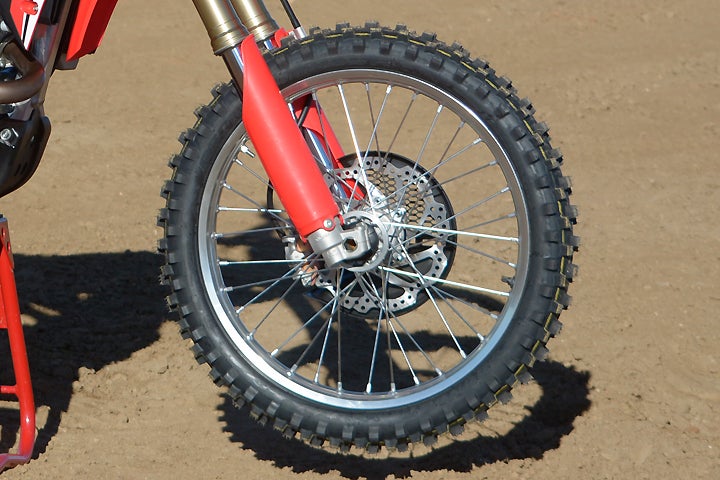
The 2017 Honda CRF450R features the same brake specs as its predecessor, using a 260mm rotor with a Nissin twin-piston caliper up front and a Nissin single-piston and 240mm rotor out back. Of all the things the DirtBikes.com test team found impressive on the new CRF450R, the Honda’s brakes were not among them. That isn’t to say that the Honda’s linear-feeing binders were bad, but they simply weren’t as powerful-feeling as some of the competition.
“Honda needs to work on the brakes,” Garvin said, chorusing the feelings of the group. “They feel linear enough, but I was really looking for more stopping power at the end of some of the fast sections.” Stover added, “They’re not the best in the class, but they’re pretty good. Burch called the CRF’s braking performance “pretty average.”
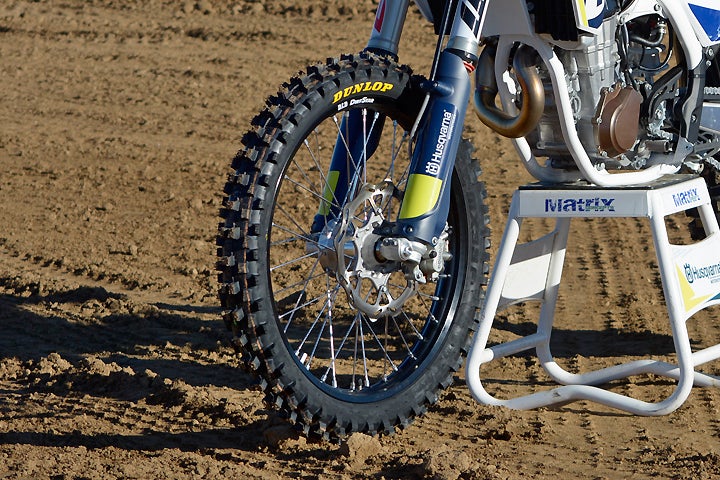
But nobody, and we mean nobody, had a bad thing to say about the Brembo 260mm, twin-piston front and 220mm, single-piston rear brakes on the Husqvarna and the KTM, which still smoke the competition when it comes to ground-clawing stopping power.
“The Husqvarna’s Brembo brakes are excellent, just like the KTMs!” Abbatoye said, and Garvin added, “Brembo brakes are amazing.” Stover simply shouted, “Brembo!” And Burch called them “the best brakes on the market.”
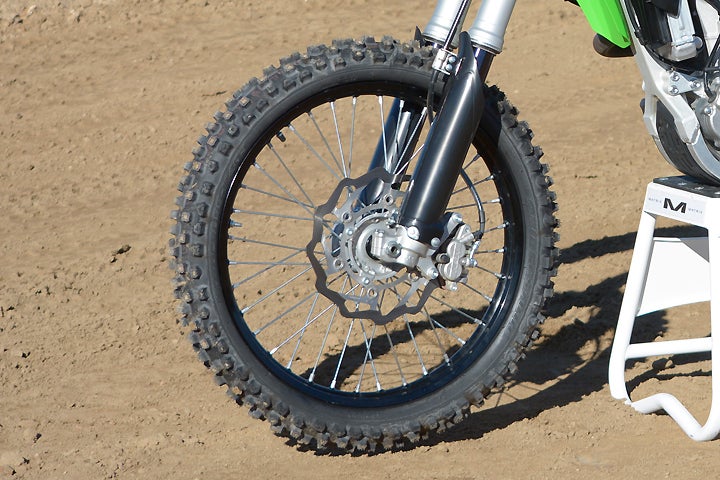
The KX450F’s oversized 270mm front disc and Nissin two-piston caliper tie the YZ450F for biggest front brake in the class. With a 240mm rear disc and Nissin single-piston out back, you would think the Kawi would deliver the kind of stopping power that would satisfy our test team. Not exactly.
“The Kawasaki’s front brake could be a little stronger,” Abbatoye said, and Garvin echoed, “The KX450F’s brakes are okay, but like the Honda’s they are not the best.” Stover felt as if they were “Not great, but not the worst.” Just as he did with the Honda brakes, Burch called the KX450F brakes “pretty average.”
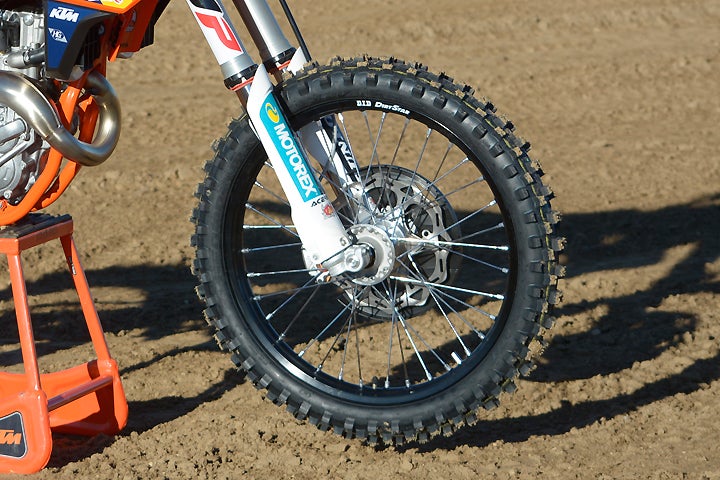
Of course, the KTM 450 SX-F Factory Edition, like the Husqvarna FC 450 received unanimous praise from the gang for its braking performance—no surprises there.
“Anyone who knows KTMs knows that they have the best brakes,” Abbatoye said, while Garvin said, “Best brakes, period. Well, best brakes, tied with the Husqvarna.” Stover simply stated, “The Brembos win again,” and Turner noted that the Factory Edition has an “excellent oversize front brake.”
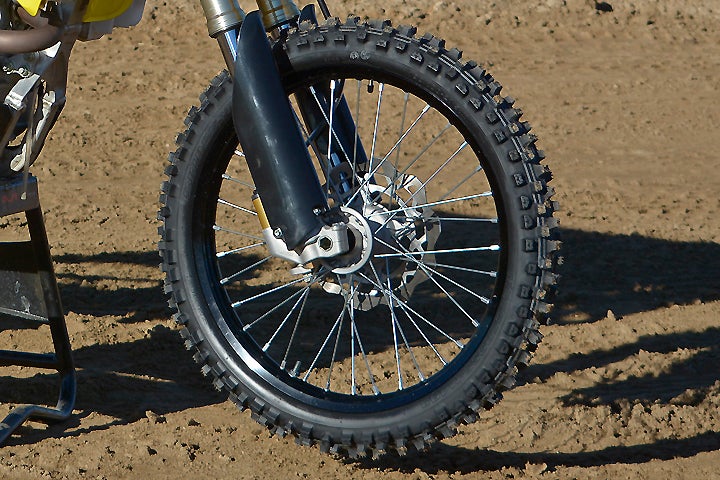
The RM-Z450 runs the smallest front rotor of the group, its 250mm unit clamped by a Nissin twin-piston caliper. Out back, the Suzuki is fitted with a 240mm rear disc and Nissin single-piston caliper. When we tested the 2016 Suzuki RM-Z450, we thought that they offered plenty of stopping power and a smooth, linear feel, but in the presence of Brembos, they suffer.
“The Suzuki’s brakes are in need of an update,” Abbatoye said. “The front brake definitely could be stronger.” Garvin, too, felt that the Suzuki brakes missed the mark, while Stover said, “They’ll slow you down, but they don’t feel very powerful at all.” Turner added, “Perhaps 270mm is now the standard and the Suzuki is in danger of having an “undersize” front brake? “Fortunately, an oversize front brake is an easy aftermarket fix, if desired.”
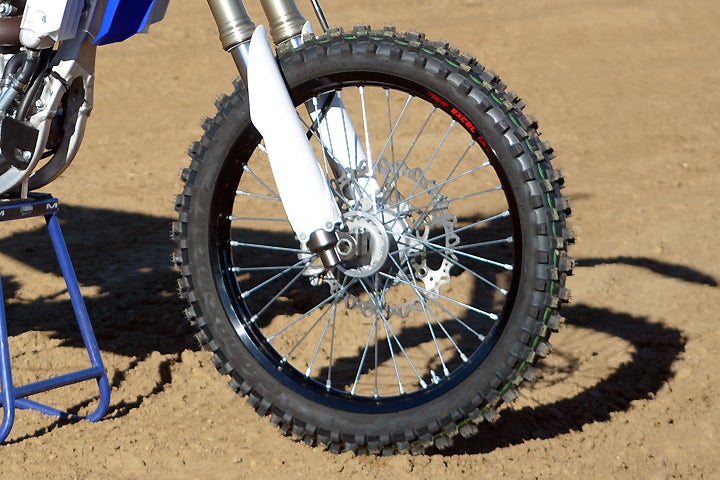
The Nissin-clamped 270mm front and 245mm rear rotors on the Yamaha YZ450F didn’t exactly offer the kind of stopping power their size would imply either.
“The Yamaha’s brakes work well, but they’re not as strong as the KTM’s or the Husqvarna’s brakes,” Abbatoye said. Stover not only griped about the YZ’s braking power but also its lack of feel in the rear. “The front brake on the Yamaha is weak, and the rear tended to lock up on me,” Stover said. “Neither the front nor the rear brake had much in the way of feel.”
 Your Privacy Choices
Your Privacy Choices